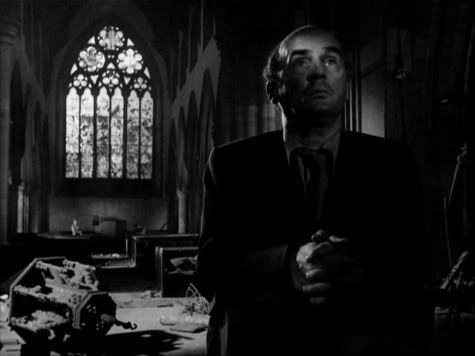 To combat the impression that all we watch here is horror and anime, here's a movie you almost certainly won't have heard of, and yet one which won an Oscar in its day. I read about Seven Days to Noon in Paul Spode's book Forgotten Films of the Fifties: some of them have been forgotten for very good reasons, but I was very glad I ordered this and watched it, even if Ms Formerly Aldgate rather tolerated it, as her tastes run in different and less monochrome directions.
To combat the impression that all we watch here is horror and anime, here's a movie you almost certainly won't have heard of, and yet one which won an Oscar in its day. I read about Seven Days to Noon in Paul Spode's book Forgotten Films of the Fifties: some of them have been forgotten for very good reasons, but I was very glad I ordered this and watched it, even if Ms Formerly Aldgate rather tolerated it, as her tastes run in different and less monochrome directions. Professor Willingdon, played by Barry Jones in a manner Paul Spode describes as 'superbly nondescript', is a humble man caught in a moral crisis. He steals a weapon (an atom bomb, though it's never described as such) from the secret research establishment where he works and sends a very polite letter to the Prime Minister threatening to detonate it in central London unless the Government renounces all such research. As the search for Willingdon proves fruitless the Cabinet orders the evacuation of the capital and slowly the net closes in on the scientist who is prepared to destroy a city, and himself, for the good of humanity, as he sees it.
The film starts sedately enough and gradually escalates into tension as the deadline draws closer. The whole machinery of the State is dedicated to hunting down the one man who threatens it, who moves towards his goal dodging soldiers in eerily deserted London streets, but in the end it's just him and a handful of others in a bombed-out church in Westminster.
I enjoyed the post-War setting and the time taken to include random, but very real, vignettes and exchanges between characters which have nothing to do with the story but which add to the verisimilitude: a pawnbroker dealing with a customer, two generals grumbling about lack of equipment, a soldier caught drinking in a cellar when he should be searching. It would all have seemed horribly familiar to audiences for whom the War was a very close memory, but even now its reality is impressive. Of course it's actually very stylised indeed, but then perhaps we were all simultaneously more understated and more stylised in those days.

No comments:
Post a Comment